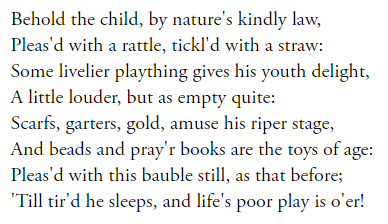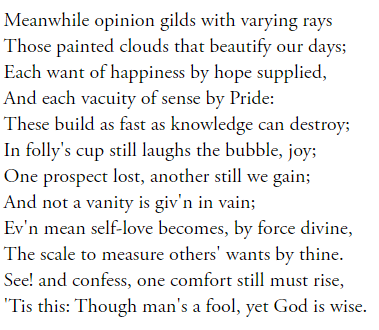Perhaps you’ll think twice the next time you feel like correcting me?
Yes, regress and progress of ever changing Universe–the collective consciousness of which I understand as “God.”
Pope was summing up Pascal in this stanza.
For in fact what is man in nature? A Nothing in comparison with the Infinite, an All in comparison with the Nothing, a mean between nothing and everything. Since he is infinitely removed from comprehending the extremes, the end of things and their beginning are hopelessly hidden from him in an impenetrable secret, he is equally incapable of seeing the Nothing from which he was made, and the Infinite in which he is swallowed up.
What will he do then, but perceive the appearance of the middle of things, in an eternal despair of knowing either their beginning or their end. All things proceed from the Nothing, and are borne towards the Infinite. Who will follow these marvellous processes? The Author of these wonders understands them. None other can do so.
…
If we are well informed, we understand that, as nature has graven her image and that of her Author on all things, they almost all partake of her double infinity. Thus we see that all the sciences are infinite in the extent of their researches. For who doubts that geometry, for instance, has an infinite infinity of problems to solve? They are also infinite in the multitude and fineness of their premises; for it is clear that those which are put forward as ultimate are not self-supporting, but are based on others which, again having others for their support, do not permit of finality. But we represent some as ultimate for reason, in the same way as in regard to material objects we call that an indivisible point beyond which our senses can no longer perceive anything, although by its nature it is infinitely divisible.
The end of Pope’s poem is also of note.


But this is quite different from how a person in the world acts.
There is not an infinite number of changes between the brush stroke and the painter’s intention to act.
That is an interesting absolute statement – all it takes is one counterexample to disprove it. Do you know what physical constants are? (They are also known as fundamental or universal constants.) How about π or e?
Replying to myself. Sad. haha I couldn’t help but add the rest of Pascal’s riff on humanity as stuck in uncertainty. He sounds positively post-modern here:
Limited as we are in every way, this state which holds the mean between two extremes is present in all our impotence. Our senses perceive no extreme. Too much sound deafens us; too much light dazzles us; too great distance or proximity hinders our view. Too great length and too great brevity of discourse tend to obscurity… Excessive qualities are prejudicial to us and not perceptible by the senses; we do not feel but suffer them. Extreme youth and extreme age hinder the mind, as also too much and too little education. In short, extremes are for us as though they were not, and we are not within their notice. They escape us, or we them.
This is our true state; this is what makes us incapable of certain knowledge and of absolute ignorance. We sail within a vast sphere, ever drifting in uncertainty, driven from end to end. When we think to attach ourselves to any point and to fasten to it, it wavers and leaves us; and if we follow it, it eludes our grasp, slips past us, and vanishes for ever. Nothing stays for us. This is our natural condition, and yet most contrary to our inclination; we burn with desire to find solid ground and an ultimate sure foundation whereon to build a tower reaching to the Infinite. But our whole groundwork cracks, and the earth opens to abysses.
Speaking of absolutes, absolute space and absolute time are just concepts, not physical reality. (That time had a beginning was the conclusion of no less an intellect than Stephen Hawking.) They are not unlike an infinite regress. An infinite regress of cats and fleas, anyone? (Some may recall that children make the best philosophers – Jesus would concur with that. ; - ) Or an infinite number of things produced sequentially in time – that will never happen in reality because there will never be any more than have been produced up to any given point in time, no matter how far in the future you pick.
We can be certain we have or had a biological father. Certainty that we have a heavenly one is possible.
There’s certainty and uncertainty. The uncertainty is not being able to reason whether the cause of the universe is aware, unaware, or not yet aware of its action.
There’s reason and not being able to reason. ; - ) When you have positive and objective reasons to know that you have a heavenly Father, you also have reason to know that the Cause of the universe is aware.
I read somewhere the physics works the same regardless of the direction you play the film, or how the math is the same with electron and conventional current theory.
Blame it on the “skeptical theist” who figured it’s possible to have an infinite series of past events as a brute fact to which present events are added. “But, wait, that’s the picture of a universe that begins in the present and has the appearance of a past as it progresses to infinity.”
I don’t think physicists have designed a functioning time machine however, nor how to rewind to ‘before’ the beginning of time.
You mean brutishly asserting and not granting skeptical theism?
It’s the problem of determining whether the universe is beginning or progressing at the event horizon.
Well not granting it where it actually lay.
If we are taking about big bang cosmology, maybe you mean the initial singularity. If it’s ‘progressing’, the prefix entails a before, and that’s problematic. I still pretty much accept a beginning to time.
That is an unknown. Cannot be proven either way.
There can. the unit of time can be divided in infinite fractions
No. He says unknowable. See his history of time.
You must not have followed the first link:
Here it is again, not camouflaged so it’s not as easy to avoid: it’s Hawking lecture, The Beginning of Time
I quote. Since events before the Big Bang have no observational consequences, one may as well cut them out of the theory, and say that time began at the Big Bang. Events before the Big Bang, are simply not defined.
So we dont know as i said.